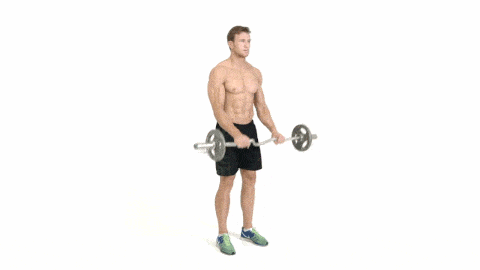Barbell Bicep Curl is technically simple, can be performed with heavy weights, and even became a competitive movement. Some people compete in this exercise, and even win international competitions. There are two main variations of this movement – a direct rise and an exercise with a curved barbell. The latter is done to relieve strain in the hands.
Barbell Bicep Curl Technique
Starting position
- Most people are comfortable doing barbell bicep curl while standing with slightly bent knees. The body may wiggle on straight legs
- The bar should be taken so that it would be positioned in hands straight, without any sway
- It is better to use underhand grip, with thumbs overlapping the bar
Movement
- By contracting biceps, bend your elbows
- Exhale on the effort
- On inhale, gently lower your arms down, straightening your elbow joints
Crucial points
- As with other biceps exercises, cheating is prohibited. You should not bring the bar to the shoulders with the help of the core or feet
- Do not lift heavy weights by swaying, it can cause injuries. It’s better to start with the feasible weight of the barbell
- Tilting the back can create a dangerous strain in the spine, and therefore is prohibited
- Resting with the elbows on the stomach with the back tilting is prohibited, as it removes the load from the target muscle
Variations
- Curved bar curl. The purpose of using such bar is to relieve strain in the hands. The biceps receive the load in this case as well
- Variating the grip width. Narrow grip shifts the load to bicep long head, while wide grip does so to the short head. Nonetheless, both exercises are considered complex.
- Overhand grip. It is used to work on forearm muscles
- Strict bicep curl. It is any option of doing the exercise completely without cheating, but in practice it can be a variation with the back against the wall
Anatomy of the Barbell Bicep Curl
Barbell bicep curl is an example of a single joint isolation exercise. Sometimes you may encounter the notion that it’s “basic for biceps”, but here it just means that it’s the main exercise for this particular muscle, and not that it’s a multi-joint basic exercise. When the forearms are pressed to the sides, and the elbows are stable, most of the load is shifted towards the lateral head of the bicep. To engage the medial one, athletes move their elbows back, behind their backs, and try to take the bar just a little narrower.
Even though this is an isolating exercise, auxiliary muscles are involved in the work:
- Brachialis
- Brachiradialis
- Round shoulder muscle
- Wrist extensor
- Deltoid muscle
Preparing for the exercise
If you have a separate day for arms workout, bicep curl is likely to be the first movement. In this case you should perform a complete joint warm-up, warm up your wrists, shoulders, elbows, and all joints of the body so that the position with the barbell would be stable. The athlete should not neglect the joint workout, even if he plans to work out his arms only.
The first warm-up set is done with light weight. Then there are options possible depending on the weight of the barbell. Some go straight to their working weight, adding 2.5 kg with each set, and some immediately take the full weight and perform 3-4 working sets. To each his own, you need to monitor the body response and exercise based on your own convenience.
If the arms workout combined with the workout of the back, usually one warm-up set is sufficient. In terms of training, lifting the barbell bicep curl may well be the only movement on this muscle, for more back exercises can be performed.
Barbell Bicep Curl – Correct performance
- The key to the correct performance of this exercise is doing it with biceps force only, without swinging the body or trying to lift the weight with the help of feet. It is normal to cheat when working with heavy weight, all athletes do that. Therefore, you need to use reasonable weights, and not try to impress anyone with this movement. Cheating can only be considered a technique for sports where speed is required. In addition, it is used as part of drop sets by experienced athletes.
- Within regular technique, it is not supposed to bring the elbows back and forth, they should be fixed at one point. This will eliminate unnecessary involvement of the core muscles.
- «Bending» the wrists toward the shoulders is also not recommended. The movement is performed by bending the elbow joint only and is not supposed to be done with the additional help from hands.
- The extension of the body back transfers the strain to the muscles of the back, therefore, it should be minimized. It is recommended to put your back against the wall if such movement appears on itself with any weights.
- It is not recommended to hold your breath during exercise, the muscles work more effectively in the «exhale on effort» mode, and not when the air is held in the lungs.
- While doing barbell bicep curl there is no need to throw the bar on the front deltoids in order to make the exercise go easier. Many people think that a peak contraction occurs at the top, but the contraction occurs 4-5 cm away from the shoulder, and you just need to tighten the biceps as tightly as possible exactly at this point, and not above or below it.
- It is not allowed to dump the barbell down by inertia or push it with the hips at the lower point of the amplitude.
- «Inserting» elbows at the lower point is not necessary, on the contrary, lowering the barbell, it is important to keep the muscles tense, so that the biceps get more tension.
- Slowing down the barbell from a high point is a technique to increase arm strength.
Common mistakes
- Helping yourself with the hips when lifting the barbell.
- Tilting the back, which allows you to bring the barbell out of the dead center.
- Twisting the hands toward the shoulders.
- Transferring body weight to the front foot arch and shifting the strain to the legs.
- Twisting the hands down at the lower point of the amplitude.
- Curling with a barbell that exceeds the capabilities of a person.
- Releasing the tension at the dead center above and stopping the movement.
- Transferring strain to the heels and tilting the spine backward.
How to increase efficiency
- To increase concentration and lift the weight strictly within the amplitude, the body should be slightly tilted forward
- Exercise works better if you do not completely relax your biceps and do not insert your elbows at the lower point of the amplitude, and also do not put the barbell on the chest at the higher point
While performing the movement with the usual straight bar, athlete receives the following advantages:
- The ability to use a wider grip to turn muscles into work differently
- A more convenient barbell for performing an overhand grip exercise
- A good grip for those with long fingers
The underhand grip is more suitable for those who want to involve the forearm muscles, and not just the biceps. Within one workout, the exercise can be performed with both underhand and overhand grip so as not to lose the benefits of both options.
Including the exercise into workout
Arm training usually begins either with this movement or with narrow chin-ups followed with this movement. Exercise is performed with more substantial weight than concentrated lifts and Scott bench exercise.
A simple test will help to correctly select the weight of a barbell. Try curling the chosen weight without a snatch, pushing from hips or other excessive movements of legs and upper body. If you cannot bend your elbows without the help of the body, the weight must be reduced.
Contraindications
- Active injuries to the wrists, elbows, lower back, and shoulders are a contraindication to performing heavy weight exercises
- Protrusions and hernias in the lumbar spine usually force people to turn to seated bicep curls or to perform a concentrated version, standing with their back against the wall
- It is not recommended to perform the exercise without wrist bandages if the wrists are overloaded with a large amount of work with heavy weight in the bench press
- The exercise is not recommended for those with inflamed arm ligaments or muscles, in which case a couple of days of rest is required for the body to recover



